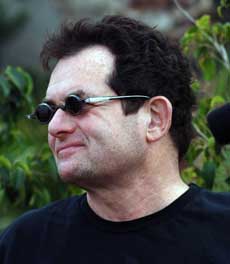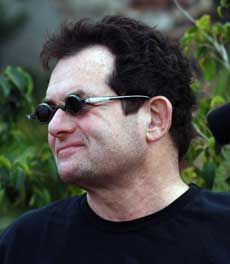 KINGSTON, R.I., Jan. 16, 2015 – On April 11, 1945, the Buchenwald concentration camp was liberated by American soldiers. They found 904 boys, all living in a disease-ridden filthy barn, alone, without their parents.
KINGSTON, R.I., Jan. 16, 2015 – On April 11, 1945, the Buchenwald concentration camp was liberated by American soldiers. They found 904 boys, all living in a disease-ridden filthy barn, alone, without their parents.
It was a miracle they survived. Some of those boys turned into men, and some of those men made the wrenching journey back to the camp decades later, with University of Rhode Island filmmaker Robert Cohen artfully documenting every step.
The result was Cohen’s documentary “Kinderblock 66: Return to Buchenwald,” so highly regarded it was selected to be screened at the United Nations in New York City in honor of International Holocaust Remembrance Day.
Free and open to the public, the film will be shown at 6:30 p.m. Jan. 28 in the U.N.’s conference room 3. Cohen will answer questions afterward. Other events at the U.N. are also planned throughout the week, including talks and exhibits.
Cohen, a lecturer in the Harrington School of Communication and Media, says he was thrilled when he found out the film, released in 2012, was chosen.
“It’s nice to have your work recognized,” says Cohen, who divides his time between New York and Rhode Island. “The Holocaust is such a meaningful topic. I know there are a lot of Holocaust books and films, but every addition to that shelf is valuable and important.”
He came up with the idea for the project years ago when a friend asked if he would make a documentary about his father, Alex Moskovic, one of boys who survived Buchenwald.
 To commemorate the 65th anniversary, in 2010, of the camp’s liberation, the Buchenwald Foundation tracked down Moskovic and other survivors and offered to pay for a three-day visit back to the camp, in Weimar. In addition to Moskovic, Cohen also followed three other men on their journey: Naftali-Duro Furst and Israel-Laszlo Lazar, both of Israel, and Pavel Kohn of Prague.
To commemorate the 65th anniversary, in 2010, of the camp’s liberation, the Buchenwald Foundation tracked down Moskovic and other survivors and offered to pay for a three-day visit back to the camp, in Weimar. In addition to Moskovic, Cohen also followed three other men on their journey: Naftali-Duro Furst and Israel-Laszlo Lazar, both of Israel, and Pavel Kohn of Prague.
“It was an extraordinary weekend,” says Cohen. “There were tears.”
Buchenwald was one of the largest German concentration camps. In 1944, teenage boys, most of whom had lost family members, flooded the camp. Adult prisoners in a Communist-led underground movement protected and cared for the boys, creating a children’s barracks, Block 66.
Living conditions were horrible: mud floors, freezing, cramped. “Imagine a barn with 1,500 people, and they’re stacked up on beds that look like bookshelves,” says Cohen. Block 66 was so infested with disease SS guards seldom went there. The block leaders are largely credited with saving the boys’ lives by removing them from the Nazi’s gaze.
After the camp’s liberation, the 904 youngsters who survived were “ scattered to the four winds” all over the world. Europe was covered with boys, and girls, “wandering around,” trying to reconnect with their parents, only to discover that they were dead, Cohen says.
Moskovic lost 41 family members – “Mother, father, brothers, uncles, aunts, cousins,” says Cohen. At 15, Moskovic boarded a ship to America to start over, as much as he could. He worked for 30 years as a production editor at ABC Sports, and today lives in Florida.
“It was profound for all these men to go back to Buchenwald,” says Cohen. “They managed it in different ways. Each of them had to create their own relationship with the past. Some were thrust back in that moment; others were able to have a little more separation because of the 65 years.”
All four men, Cohen says, went on to lead healthy and productive lives. “They all have grandchildren,” Cohen says. “To them, that’s a miracle.”
At URI since 2012, Cohen teaches film production and history, and the business of media. “I love being part of URI,” he says. “The work I do needs to be fresh and original all the time, and working with young people keeps me fresh and original. Being in a community of the mind has irreplaceable value.”
Cohen has a long career in film. He created CBS’ NextWorld and FutureCar, which aired on the Discovery Channel; produced the film The Longest River, part of the PBS series Quest; and even directed an opening film for the Super Bowl.
As a writer and director in advertising and corporate media, he has created film and television spots for General Motors, Cisco, GAP, Sony, McDonald’s and General Electric.
For information about Kinderblock 66:, visit Return to Buchenwald or Kinderblock 66.
Pictured above
Robert Cohen, a lecturer in the Harrington School of Communication and Media at the University of Rhode Island and director of Kinderblock 66: Return to Buchenwald.
Left to right, Alex Moskovic, Israel-Laszlo Lazar, Pavel Kohn and Naftali-Duro Furst, at Buchenwald concentration camp in Germany.
Photos courtesy of Robert Cohen.

